Record amount of dangerous driver footage handed to police by cyclists
Many cyclists capture footage of their journeys, with basic cameras available for under £50

Footage of dangerous overtakes on cyclists, captured by helmet and bike cameras, is being sent to police in record numbers.
Data obtained by IAM RoadSmart, a road safety charity, revealed that 15,779 clips were submitted to police forces in England and Wales last year.
This is more than double the 7,249 submissions made in 2021. Many cyclists use cameras to record their journeys, with basic models available for under £50.
IAM RoadSmart sent a Freedom of Information request to 43 police forces, asking for data on footage submissions showing motorists passing cyclists too closely.
The submissions were made as part of Operation Snap, an initiative introduced in 2017.
Twenty forces provided data, which showed that the percentage of reports leading to a notice of intended prosecution rose from 38 per cent in 2021 to 54 per cent last year.
A separate survey of 655 drivers who are members of IAM RoadSmart indicated that 58 per cent were unaware that the Highway Code recommends a minimum 1.5-metre gap when passing cyclists.

Harriet Hernando, the charity’s active travel spokeswoman, said: “It is extremely concerning that more than half of motorists don’t know how much space to give a cyclist when overtaking.
“Passing too closely to a cyclist can be intimidating and dangerous, especially if they need to move out to avoid a pothole.
“It is small wonder then that record numbers of cyclists are installing cameras and submitting footage of dangerous or careless drivers to the police.
“While it is heartening to see that prosecution rates have increased, it would be better if it didn’t reach that stage and motorists weren’t doing it in the first place.”
Provisional Department for Transport figures show 85 cyclists were killed on Britain’s roads in 2024.
Between 2019 and 2023, most cyclist fatalities occurred in collisions involving a car.
IAM RoadSmart has launched a No More Close Calls campaign aimed at eradicating close passes.

Ms Hernando said: “When overtaking a cyclist, always look beyond them to judge your ability to get past safely, leaving at least 1.5 metres of space when overtaking at speeds of up to 30mph and give them more space when overtaking at higher speeds.
“By hanging back two or three car lengths, you’ll be able to see further up the road and look out for oncoming traffic.
“If it isn’t safe to overtake then don’t try and squeeze past – shaving seconds off your journey isn’t worth taking someone’s life.”
Duncan Dollimore, head of campaigns at Cycling UK, said it has “not seen the big safety impact we’d hoped for” from changes to the Highway Code in 2022 providing more protection to cyclists.
He went on: “The majority of people who drive simply aren’t aware how much distance to give to people who cycle when overtaking.
“This is why it’s crucial to educate all road users of their responsibility to protect those most vulnerable.”
He called on the Government to “address this oversight by better promoting the new Highway Code”.
A Department for Transport spokesperson said: “We take road safety extremely seriously, and there are already strict penalties in place for those who put the safety of cyclists at risk.
“Our roads are among the safest in the world, but we are always looking to improve.”
Join our commenting forum
Join thought-provoking conversations, follow other Independent readers and see their replies
Comments
Bookmark popover
Removed from bookmarks